Key takeaways:
- Understanding and analyzing business failures is crucial for learning and future success.
- Resilience is essential for navigating setbacks, and fostering a supportive network enhances emotional well-being.
- Setting small, achievable goals and practicing gratitude can help maintain a positive mindset after failures.
- Sharing experiences with others builds a sense of community and can lead to mutual learning and inspiration.
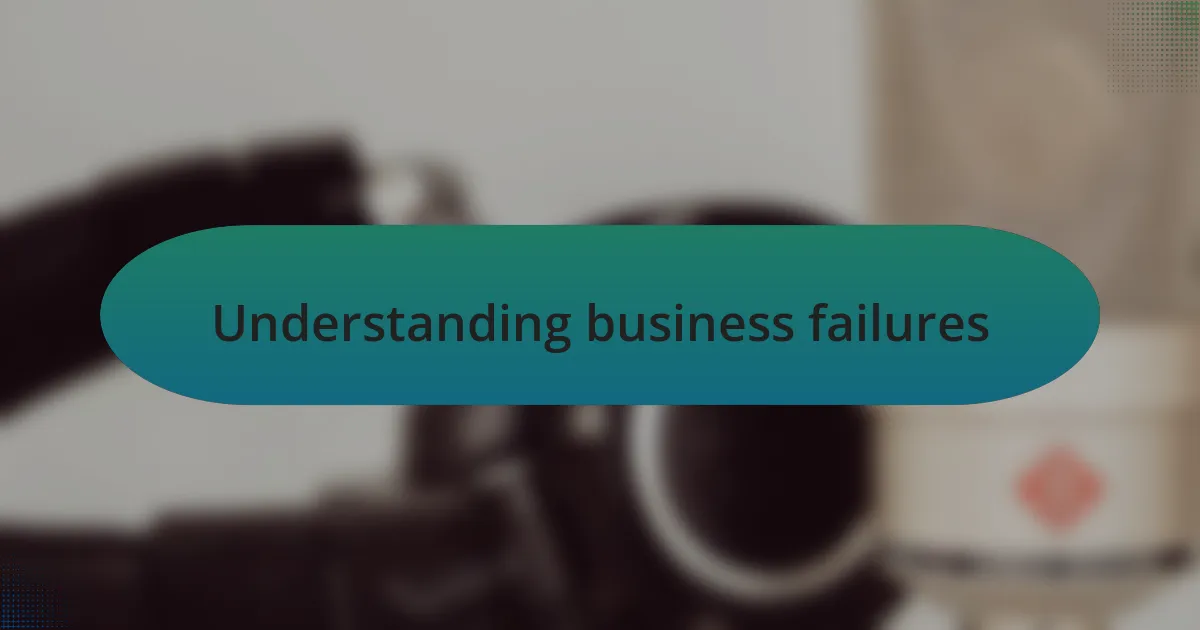
Understanding business failures
Business failures can often feel like a punch in the gut, can’t they? I’ve had my fair share of setbacks, and each time has taught me something crucial about resilience and adaptability. When a project I’ve invested time and energy into collapses, there’s that initial wave of disappointment. I remember one particular instance where I poured my heart into a launch that just fizzled out. It was disheartening, but in hindsight, that experience forced me to really analyze what went wrong.
Understanding the reasons behind these failures is vital. I often reflect on whether it was poor market research or maybe a lack of adequate resources. Have you ever paused to consider what led to a setback in your own endeavors? Those moments of introspection can be powerful, revealing insights that pave the way for future success. I’ve realized that each failure is an opportunity disguised as a lesson, waiting for me to uncover its value.
Additionally, embracing the emotional aspects of failure can be transformative. The grief of losing a venture taps into deeper feelings of self-doubt and fear of judgment. I’ve learned to acknowledge these emotions instead of pushing them aside. It’s surprising how allowing myself to feel and process these emotions has opened the door to creative solutions and a renewed determination. After all, isn’t it easier to move forward when we accept our feelings rather than deny them?
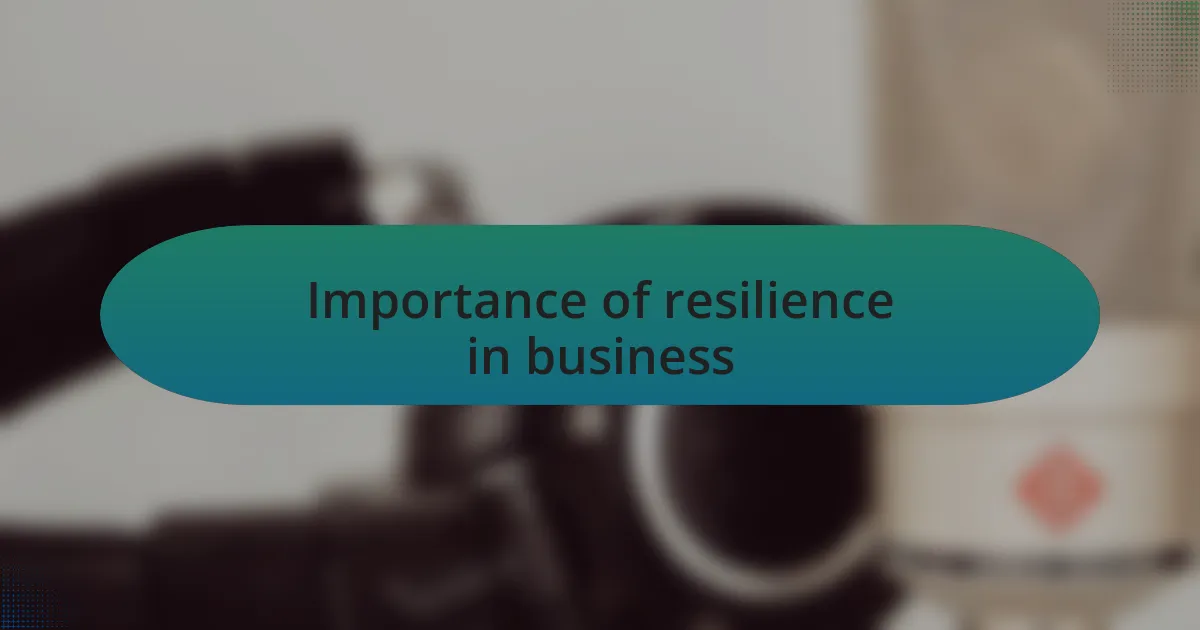
Importance of resilience in business
Resilience in business is essential; it allows entrepreneurs to navigate the storms of failure with a steady hand. I recall a time when a significant partnership I had been counting on fell through at the last minute. Instead of dwelling on the setback, I focused on re-evaluating my strategies and seeking out new relationships. That experience taught me that resilience is not just about bouncing back; it’s about adapting and staying open to new possibilities.
When faced with challenges, having a resilient mindset can transform your approach. One of the most pivotal moments in my career came when I learned to see failures as stepping stones rather than roadblocks. I once spent months developing a product that failed to resonate with consumers. At that moment, I had a choice: to give up or learn from the feedback. Embracing that feedback not only sparked a redesign but ultimately led to a much more successful product launch down the line. How do you view the challenges you face?
It’s vital to recognize that resilience also nurtures your emotional well-being. I’ve experienced moments where I felt overwhelmed, questioning my decisions and direction. Yet, I’ve found that reaching out to fellow entrepreneurs in similar situations can be incredibly cathartic. Sharing our stories, our failures, and our recoveries creates a supportive community. When I reflect on these connections, I realize how important it is to foster resilience not just within ourselves but in those around us as well. How do you build your support network during tough times?
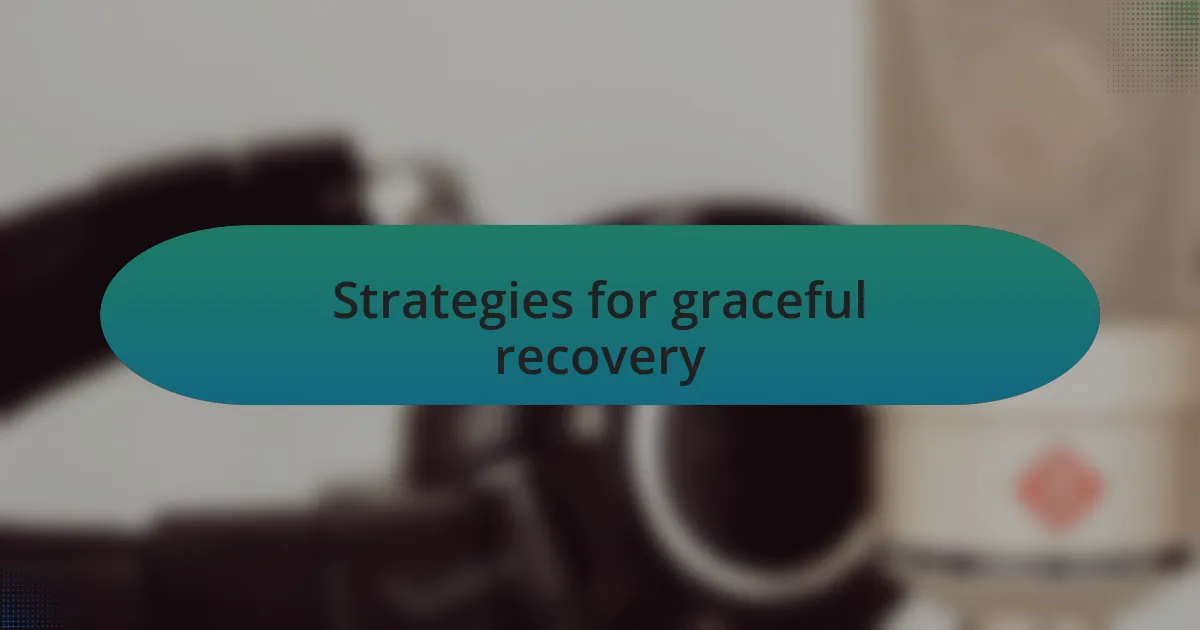
Strategies for graceful recovery
When it comes to recovery after a setback, the first strategy I employ is to conduct a thorough analysis of what went wrong. I remember a time when a marketing campaign I launched flopped spectacularly. Instead of merely shifting the blame, I took the time to gather analytics and feedback. What were the common threads in the responses? By dissecting the failure, I gained invaluable insights that shaped my future campaigns. Have you ever looked closely at a failure to uncover hidden lessons?
Another effective method is to engage in open dialogue with your team or advisors. I made it a point to hold a brainstorming session following a project that didn’t meet expectations. The room was charged with creativity and fresh perspectives. It reminded me that diverse viewpoints often lead to innovative solutions. Have you considered how your team might play a role in your recovery process?
Additionally, I’ve learned the importance of setting small, achievable goals after a setback. During a particularly challenging phase, I focused on incremental improvements rather than overwhelming myself with grand plans. This approach not only provided a sense of accomplishment but also rekindled my motivation. It’s fascinating how little victories can pave the way for greater successes. What small steps could you take to rebuild your confidence?
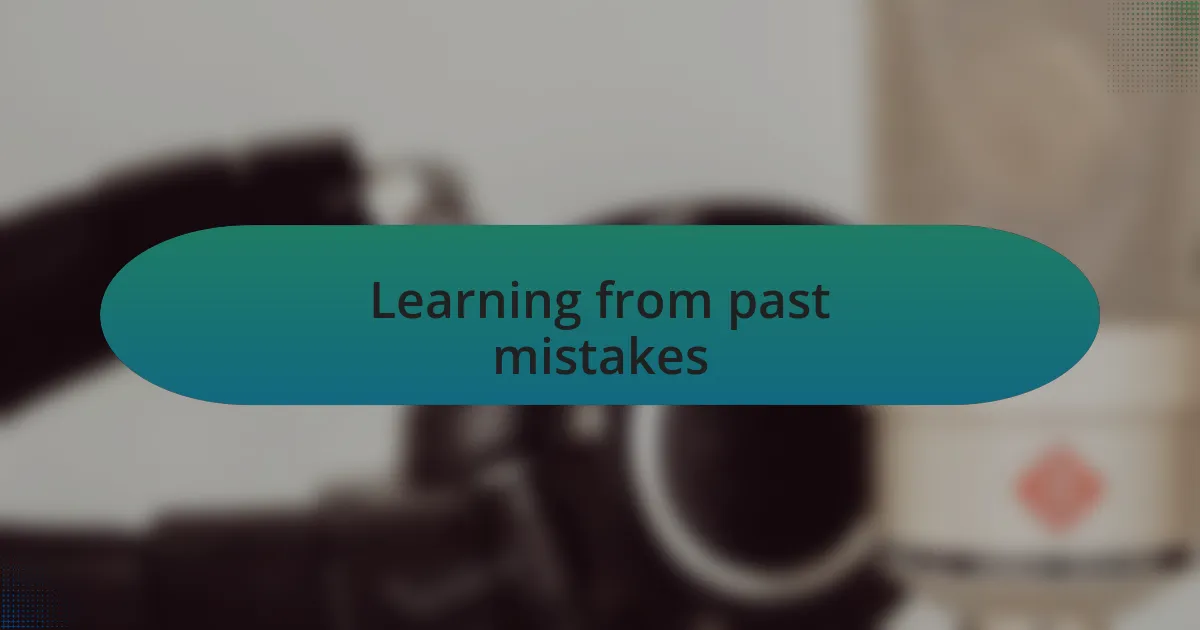
Learning from past mistakes
Reflecting on past mistakes has been a game-changer for me. For instance, after a poorly executed product launch, I sat down to revisit not just the numbers but also my gut feelings during the process. I realized I had rushed several decisions under pressure. By acknowledging these instincts, I learned to trust my intuition in tandem with data analysis. Have you ever stopped to consider how your intuition might guide you through your own missteps?
One key lesson I’ve taken from my failures is the significance of adaptability. I recall a time when I stubbornly clung to an outdated strategy, thinking it would eventually work. Instead, I faced constant setbacks. It was only when I allowed myself to pivot and explore fresh ideas that progress was made. This taught me that flexibility is crucial in navigating the turbulent waters of business. Do you ever find it hard to let go of plans that aren’t yielding results?
Lastly, documenting my failures has become an essential practice. After a setback, I engage in journaling, detailing what didn’t work and why. On one occasion, revisiting these notes revealed recurring themes in my errors, such as lack of market research or insufficient communication. This reflective approach not only emphasizes accountability but also creates a roadmap for improvement. What insights might you uncover by simply writing down your experiences?
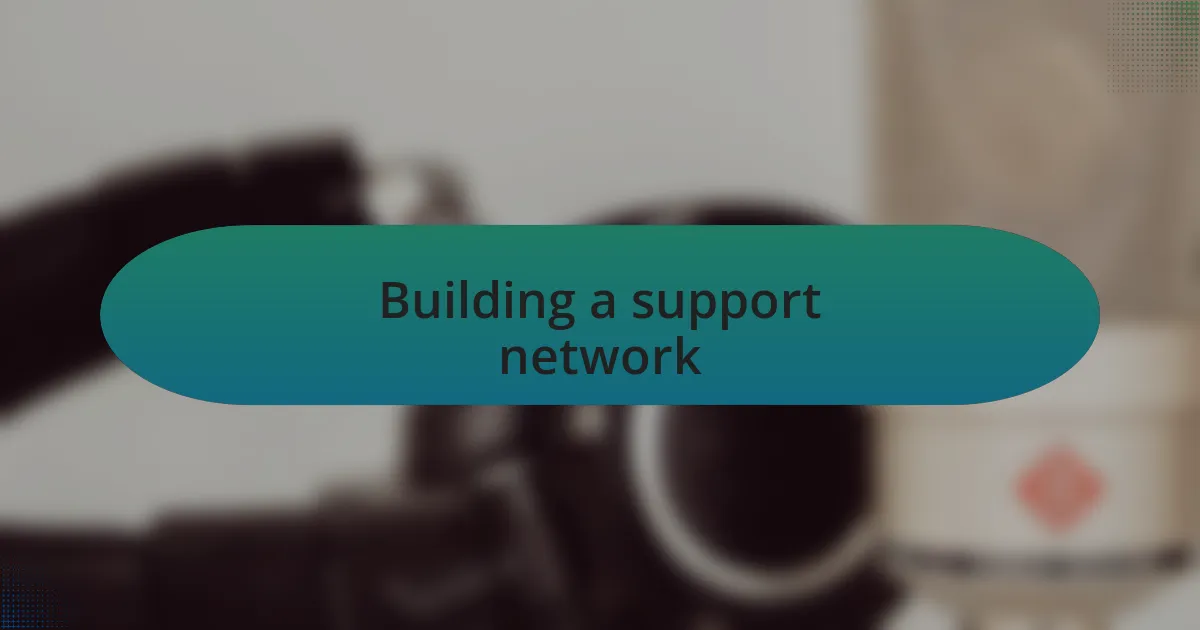
Building a support network
Building a strong support network has been crucial in overcoming business failures. I remember when a major project of mine fell flat, leaving me feeling isolated and defeated. It was during that tough phase that I reached out to fellow entrepreneurs for advice. Their experiences and encouragement helped me regain perspective, reminding me that I wasn’t alone in my struggles. Have you ever thought about who you could turn to in your own moments of doubt?
I’ve also found that diversifying my network adds richness to my support system. Connecting with individuals from different industries has opened my eyes to alternative strategies and fresh ideas. After failing to meet a quarterly goal, a friend in the tech sector shared how they pivoted their approach, inspiring me to think outside the box. This kind of cross-pollination not only fosters creativity but also deepens relationships. Have you explored how other fields might inform your own?
In moments of vulnerability, the strength of my support network truly shines. During one particularly challenging period, I organized a small gathering with trusted peers, where we each shared our setbacks and learnings. The act of sharing not only lightened my emotional load but also sparked insightful discussions that led to actionable solutions. It made me realize that vulnerability can be a powerful connector. How might your own experiences encourage others to open up around you?
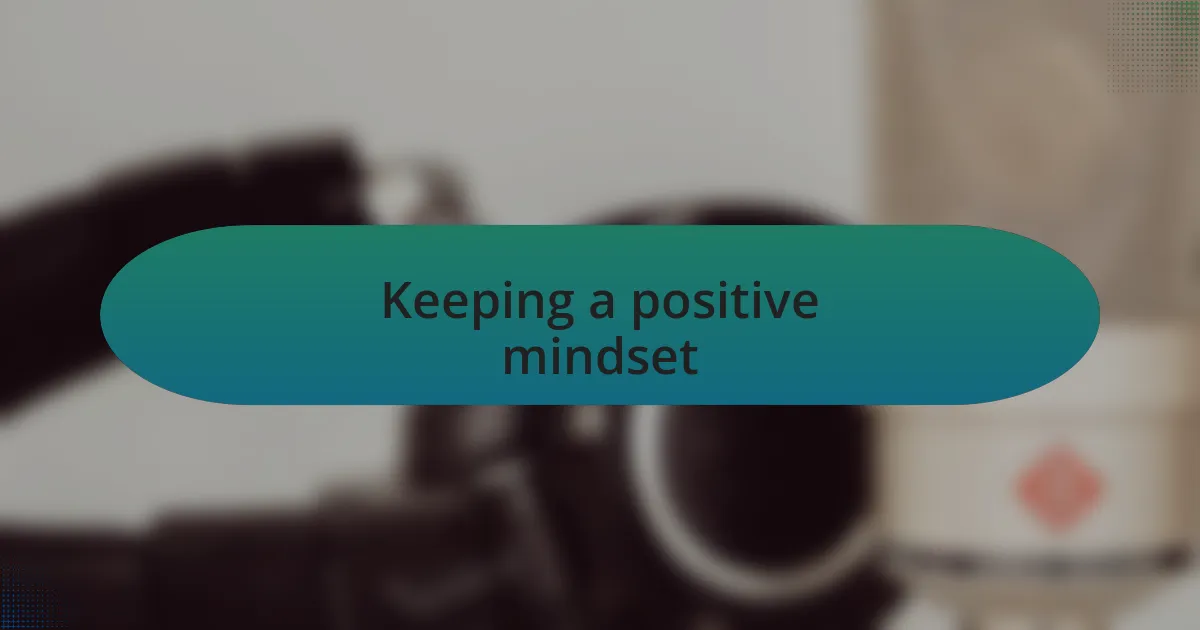
Keeping a positive mindset
When facing business failures, maintaining a positive mindset can sometimes feel like an uphill battle. I recall an instance when I lost a significant client, and the rush of panic was palpable. Instead of spiraling into negativity, I took a deep breath and focused on what I could control. I reminded myself that setbacks are temporary and often lead to unexpected opportunities. Have you ever stopped to reflect on how your setbacks might actually be stepping stones in disguise?
One effective strategy I employ to keep a positive perspective is to practice gratitude. After that client loss, I started jotting down things I was thankful for each morning, from supportive colleagues to the learning experiences embedded in failure. This simple practice shifted my focus from what went wrong to what I could build upon. It made me wonder, how often do we overlook the positives that surround us, especially during tough times?
I also find that visualizing success can be incredibly motivating. During a rough patch, I would close my eyes and picture not just my goals, but the path I would take to achieve them. This mental exercise filled me with hope and determination, reigniting my passion for my work. Have you ever visualized your success and felt that spark of excitement? It’s a powerful tool that reminds us that failure is merely a detour on the road to achievement.
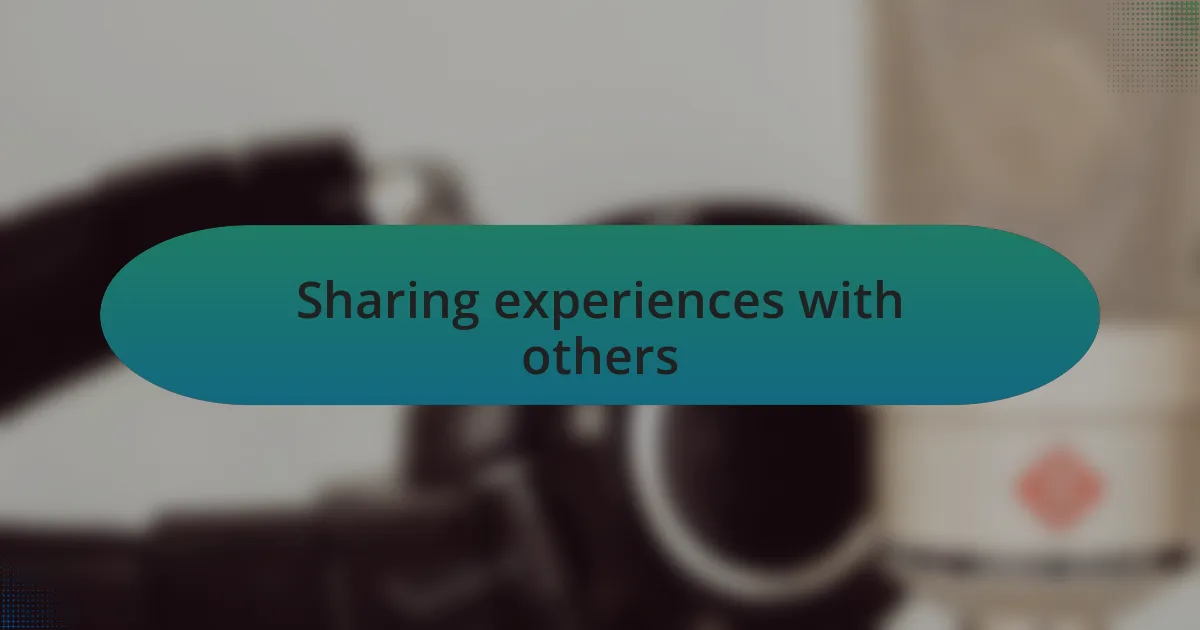
Sharing experiences with others
Sharing my experiences with others has been a game changer for me. I remember sitting in a small café, discussing my recent setbacks with a mentor who had weathered his share of storms. Hearing his stories made me realize that I wasn’t alone in my struggles; it was comforting and enlightening. Isn’t it fascinating how discussing failures can foster a sense of community?
When I share my journey, particularly the failures, I often see a shift in those around me. For example, during a networking event, I openly talked about my initial failures in launching a product. The response was overwhelming; people came up to me afterward to share their own stories. This mutual sharing creates an incredible bond and reminds me that vulnerability can build bridges instead of walls. How often do we miss the chance to connect with others over our shared experiences?
I’ve also witnessed the transformative power of sharing in more formal settings, like workshops. I once led a session where participants recounted their own failures and lessons learned. The atmosphere shifted from heaviness to hope as we exchanged insights. It became clear: learning from each other’s experiences not only alleviates the burden of failure, but also equips us with diverse strategies to rise again. Have you ever thought about how your story could inspire someone else’s journey?